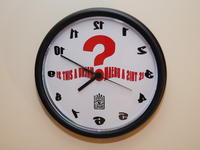Hey all. I'm terrified of trying a WILD. The whole idea of hearing/seeing weird stuff and not being able to move really scares me. What do you hear/see when entering a WILD? Are these things scary? |
|
Results 1 to 10 of 10
Thread: Terrified of trying WILD
Hybrid View
-
01-29-2009 12:17 AM #1
 Terrified of trying WILD
Terrified of trying WILD
-
01-29-2009 12:21 AM #2
You can still move.. it's not often that sleep paralysis will come into play. It's usually the case that WILD's are manipulating hypnagogic imagery into a "lucid dream". Furthermore, it's hardly ever frightening as you are more or less vividly seeing what you imagine.
Sleep paralysis occurs when the brain enters slow-wave sleep. The period of slow wave sleep is accompanied by relaxation of the muscles and the eyes. Heart rate, blood pressure and body temperature all fall. If awakened at this time, most people recall only a feeling or image, not an active dream. This also explains the groggy "slow" feeling when awakening. During this time, the afferents responsible for movement are paralyzed in order to keep the body from injuring itself or taking involuntary action during sleep. The somatosensory cortex (the part of the brain primarily responsible for movement and motor control) is essentially, deactivated.It would be great if multiple people could respond. I want to know what to expect. Also, you are paralyzed during when entering a WILD, right? Sleep Paralysis is my greatest fear- I find it very scary.


Quite simply put, sleepwalking occurs when the pathways that are closed off during REM sleep to prevent neurotransmitters from reaching the somatosensory cortex, or any other motor lobes of the brain, open up and allow neurotransmitters to reach these areas, which will then cause the body to act out actions done throughout REM sleep.
Periodic limb movements of sleep are intermittent jerks of the legs or arms, which occur as the individual enters slow wave sleep, and can cause arousal from sleep. Other people have episodes in which their muscles fail to be paralyzed during REM sleep, and they act out their dreams (sleepwalking). This REM behavior disorder can also be very disruptive to a normal nights' sleep. Both disorders are more common in people with Parkinson's disease, and both can be treated with drugs that treat Parkinson's, or with an anti-epileptic drug called clonanzepam.
Overall, 6.2% (5.7 to 6.7%) of the sample (n = 494) had experienced at least one SP episode in their lifetime. At the time of the interview, severe SP (at least one episode per week) occurred in 0.8% of the sample, moderate SP (at least one episode per month) in 1.4%, and mild SP (less than one episode per month) in 4.0%. Significant predictive variables of SP were anxiolytic medication, automatic behavior, bipolar disorders, physical disease, hypnopompic hallucinations, nonrestorative sleep, and nocturnal leg cramps.
(Journal of Neurology, http://www.neurology.org/cgi/content/abstract/52/6/1194 )
I hope this has been enlightening.
Edit:
Welcome to Dream Views! I LOVE Cicero! Have you read Plutarch?
~
-
01-29-2009 12:28 AM #3
First of all,

Next, know that there is NOTHING scary about it. The only way it will be scary is if you make it scary. Mind over matter.
And if you still think it's scary, then don't try WILD. Try something that fits you better. There are tons of options.

This guy, , and this guy,
, and this guy,  , are mine. BACK OFF!
, are mine. BACK OFF!
-
01-29-2009 12:30 AM #4
To be quite honest, I never got the audio hallucinations or visual ones which I thought I would get because I was terrified of sleep paralysis. The only one I got was this morning, it was some rainbow guy it was funny. Then I fell unconscious. I get the tactile ones, which I guess are rare.
I recommend, on the weekends, going to bed at like 12 or so and get up at 6:15 or when it's not pitch black, just dark. Then try. That way if you happen to open your eyes, it's light out.Last edited by hellohihello; 01-29-2009 at 12:33 AM.
if you can read this then you are about to be punched
-
01-29-2009 02:33 AM #5

O'nus- I don't read him but I want to some day. I just am obsessed with Classical History (particularly the late republican-early Roman empire era). Thanks for all your help everyone. I really appreciate it. I guess it was just misinformation that had me scared-I was under the impression that you would hear demonic sounding voices and hallucinate disturbing images... guess not
 ! It sounds a little fun now, actually. Will try this weekend. Is it that difficult?
! It sounds a little fun now, actually. Will try this weekend. Is it that difficult?
-
01-29-2009 04:17 AM #6
All people experience different hallucinations. That's why I made this poll to see what people experience
http://www.dreamviews.com/community/...ad.php?t=72632
And not audio hallucinations are scary voices, sometimes it's sounds like a bunch of fans, sometimes it sounds like nothing, it can sound like voices.if you can read this then you are about to be punched
-
01-29-2009 04:46 AM #7¿ƃuıɯɐǝɹp noʎ ǝɹɐ Achievements:




- Join Date
- Mar 2008
- Gender

- Location
- New Zealand
- Posts
- 926
- Likes
- 36
You should definitely try it! It's not scary at all! It's amazing fun! Put it this way... this morning I WILDed into a False Awakening and I was deliberately trying to summon a troll to fight with for fun. Just remember none of it is real! You will be amazed by what your brain does. Hypnagogic Imagery can be stunning and so interesting. I once had a small dog running around my head on the bed yapping. That was really cool and funny!
I find WILDing really really easy but some people find it tricky. Once you know and understand your mind and body it's pretty easy to do.
Good luck and have fun!!!




 LinkBack URL
LinkBack URL About LinkBacks
About LinkBacks






 Reply With Quote
Reply With Quote





Bookmarks